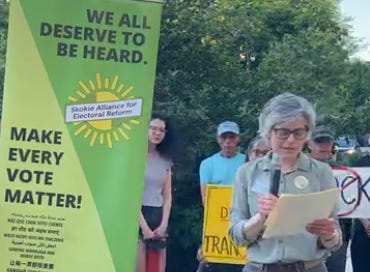Gail Schechter leading a press event outside Skokie Village Hall Monday.
Lately, even when Skokie does the right thing it does it the wrong way.
Skokie Mayor George Van Dusen – doubtlessly with the aid and agreement of Corporation Council Michael Lorge, the Skokie Caucus big shot – had come up with a really dumb idea that good people wanted him to get rid of. The dumb idea was to put three unnecessary advisory referendums on the November ballot to block three other – binding – referendums intended to reform the village’s electoral process (Illinois towns can only have three local ballot questions at a time). Monday night, when the mayor’s referendums came up on the village’s agenda, he yanked them, claiming he didn’t want to contribute to divisiveness in politics.
He didn’t publicly ask any of his fellow board members if it was okay to take the issues off the agenda. He just did it. They sat there and watched.
“I’m not going to celebrate the mayor fixing a problem that he caused,” resident Callie Folke said from the Village Hall podium. “In speaking to the rest of the board, just because the mayor proposes it doesn’t mean you have to go along with it. There are six trustees for a reason. If the mayor was meant to make unilateral decisions, there would not be a village board.”
Maybe Skokie trustees’ opinions don’t matter, anyway. Even those of the 23-year mayor might not matter much. Maybe what matters is what the candidate-screening Skokie Caucus thinks. And Van Dusen had already heard from them since the doomed proposal was posted on the agenda last Thursday.
Who wants to attach their name to something undemocratic as Van Dusen’s scheme? Ick. Especially after a weekend of citizen disgust.
Ambria Benesch, a sustainability consultant and Skokie electoral activist, told Van Dusen, “I’m glad that you rescinded the resolution, but I want to thank not you but all Skokie citizens for their outrage and, as the mayor says, ‘their divisiveness.’ That was not insidious divisiveness. That was righteous anger.”
Some Skokie electoral reform advocates worry that the Caucus runs the village instead of the residents. Van Dusen may have confirmed that fear when he tried to block the ballot initiative. He did it again when he dumped his own proposal without the public advice and consent of the Skokie Village Board.
That’s happened before. Something turns up on the village board agenda that seems controversial, and Van Dusen says, “Never mind.”
The Caucus probably fears the electoral-reform ballot questions, which if law, would level the political playing field. And the entire Village Board owes its seats to the Caucus. That is, except for Trustee James Johnson, who co-leads the Skokie Alliance for Electoral Reform, which created the three reform referendums, and is out there collecting at least 1,800 signatures for each.
But there’s a significant segment of the Caucus that didn’t like Van Dusen’s referendums, either, because they make the Skokie Village Board look like Russia’s Duma. Or Chicago’s City Council, even.
So Van Dusen’s three referendums had to go. The optics were too awful. An allegedly progressive suburb using a ballot gimmick to stop a public ballot initiative?
And the Village Board doesn’t seem to like to see its members publicly scrap, and that was going to happen. Argument is to be avoided. Everybody votes the same way.
Apparently, the Caucus doesn’t like arguments, either. And what the Caucus wants, the Caucus gets. It’s run the town since 1965. That’s why Johnson, an independent who was elected by happenstance a year ago, and Alliance co-founder Gail Schechter, think it’s high time for a change.
The Alliance seeks three binding referendums for November: for staggered elections, nonpartisan ballots (no affiliation after names) and a hybrid system of wards and at-large representation. Most Illinois towns have the first one, and many have the other two.
The village was planning to ask about banning plastic grocery bags and gas-powered leaf blowers, and changing the frequency of garbage collection from twice-weekly to once.
Skokie sustainability mavens were a little non-plussed by Van Dusen’s claim that answers to such questions were needed, since the village already had a sustainability survey in the field.
“We know you deeply care about Skokie,” Schechter told Van Dusen on Monday. “But what you really proposed tonight would have been the opposite of caring and courage. It would have represented fear, fear of the other and fear of allowing the richness of our diversity to flourish.”
And now, there’s more reason for Van Dusen to be afraid. The movement to change the village’s old-fashioned electoral system was not a specifically anti-Caucus initiative. It was, and is, just intended to level the field. But several of the two dozen or so Monday speakers seem to have now built up an enmity toward the organization that has chosen almost all of the village’s board members for 56 years. They talked about the organization as setting itself above the people in zoning and other matters.
“I don’t know what the Skokie Caucus stands for,” 18-year resident Ted Smukler said, referring to a political philosophy. “But I do know from what I have seen here that it stands for ‘Developers can do anything they want.’ And it stands for the Chamber of Commerce reigning supreme.”
Sign up to get Irv Leavitt’s “Honest Context” free in your inbox. Press “subscribe.” Please consider sharing this piece on social media, even if you don’t think it’s any good. You can entitle your post, “I hate this.”
ReplyForward





Excellent article, Irv.